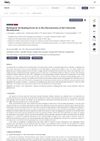 5 citations,
September 2017 in “Plastic and Aesthetic Research”
5 citations,
September 2017 in “Plastic and Aesthetic Research” Low dose cyclical nutrition therapy can consistently and safely improve hair growth and density without needing anti-androgens.
 4 citations,
September 2023 in “Stem cell research & therapy”
4 citations,
September 2023 in “Stem cell research & therapy” Special particles from umbilical cord stem cells help heal skin wounds in diabetic mice by preventing certain immune cell death.
[object Object] 3 citations,
June 2022 in “Cells” The conclusion is that the new method makes collecting cells from plucked hair to create stem cells more efficient and less invasive.
3 citations,
November 2022 in “International journal of molecular sciences” Bio-pulsed stimulation increases production of beneficial vesicles from bird stem cells that improve skin and hair cell functions.
3 citations,
January 2022 in “Journal of neuroendocrinology” Sex hormones affect brain cells differently in males and females.
2 citations,
February 2024 in “Toxins” Bee venom can help stem cells promote hair growth.
 2 citations,
January 2022 in “Skin Pharmacology and Physiology”
2 citations,
January 2022 in “Skin Pharmacology and Physiology” Dexamethasone increases the activity of androgen receptors in human skin cells, which may link it to certain types of hair loss.
 2 citations,
January 2017 in “AIMS cell and tissue engineering”
2 citations,
January 2017 in “AIMS cell and tissue engineering” Mesenchymal stem cells show promise for treating various skin conditions and may help regenerate hair.
1 citations,
May 2024 in “Applied Sciences” Cordyceps militaris is a promising, cost-effective medicinal fungus with health benefits and efficient production methods.
 1 citations,
August 2023 in “International Journal of Molecular Sciences”
1 citations,
August 2023 in “International Journal of Molecular Sciences” Platelet Rich Plasma-Derived Extracellular Vesicles show promise for healing and regeneration but need standardized methods for consistent results.
1 citations,
April 2023 in “International journal of molecular sciences” Certain skin proteins can form anchoring structures without the protein AMACO.
[object Object] 1 citations,
March 2023 in “Pharmaceutics” PBMCsec can help reduce and improve thick skin scars.
 1 citations,
February 2023 in “ACS Biomaterials Science & Engineering”
1 citations,
February 2023 in “ACS Biomaterials Science & Engineering” The new microwell device helps grow more hair stem cells that can regenerate hair.
 1 citations,
January 2022 in “Stem cell biology and regenerative medicine”
1 citations,
January 2022 in “Stem cell biology and regenerative medicine” New methods to test hair growth treatments have been developed.
1 citations,
May 2022 in “International journal of molecular sciences” Faulty LEF1 activation causes faster skin cell differentiation in premature aging syndrome.
 1 citations,
November 2021 in “Biomedicines”
1 citations,
November 2021 in “Biomedicines” Understanding how acne develops in different diseases could lead to new treatments.
1 citations,
December 2020 in “International journal of molecular sciences” External factors can cause skin cancer cells that usually don't spread to grow and form tumors in mice.
 September 2024 in “International Journal of Molecular Sciences”
September 2024 in “International Journal of Molecular Sciences” Hydrangea serrata extract may promote hair growth and improve hair health.
August 2024 in “Cosmetics” Peanut callus extract helps grow hair and prevent hair loss.
 July 2024 in “Pharmaceutics”
July 2024 in “Pharmaceutics” The new hydrogel treatment promotes faster hair growth and better skin health for hair loss.
May 2024 in “Regenerative Therapy” Dendrobium officinale polysaccharide helps hair growth by activating the WNT signaling pathway.
 April 2024 in “Journal of translational medicine”
April 2024 in “Journal of translational medicine” MJ04, a new compound, effectively promotes hair growth and is a potential topical treatment for hair loss.
 March 2024 in “Cell communication and signaling”
March 2024 in “Cell communication and signaling” Lack of sleep in mice leads to prostatitis by reducing certain hormones and activating an inflammatory pathway, which can be temporarily fixed with normal sleep.
 January 2024 in “ACS Biomaterials Science & Engineering”
January 2024 in “ACS Biomaterials Science & Engineering” A new method using a microfluidic device can prepare hair follicle germs efficiently for potential use in hair loss treatments.
 January 2024 in “Biotechnology advances”
January 2024 in “Biotechnology advances” Bioassays help find useful compounds in nature for making medicines, supplements, and cosmetics.
 January 2024 in “Indian Journal of Pharmaceutical Sciences”
January 2024 in “Indian Journal of Pharmaceutical Sciences” Peach kernel extract may promote hair growth by boosting cell growth in hair follicles.
 December 2023 in “Scientific Reports”
December 2023 in “Scientific Reports” Scientists created cell lines from balding patients and found that cells from the front of the scalp are more affected by hormones that cause hair loss than those from the back.
 November 2023 in “Cell Proliferation”
November 2023 in “Cell Proliferation” A protein from fat-derived stem cells, DKK1, is linked to hair loss and blocking it may help treat alopecia areata.
September 2023 in “Pharmaceutics” The new face mask with Eflornithine can potentially reduce facial hair growth and moisturize skin.
 August 2023 in “Micromachines”
August 2023 in “Micromachines” The new method can create hair follicle-like structures but not complete hair with roots and shafts, needing more improvement.

















